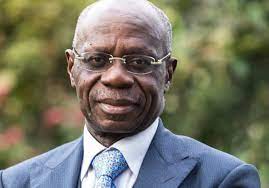
When a top American diplomat was sent to meet with Albert Yuma at his home in Kinshasa to make clear that the United States strongly objected to the plan, according to an interview with the diplomat, J. Peter Pham.
After pulling out a bottle of Cristal Champagne, Yuma talked with Pham about political events in Congo, but things soon turned sour. Pham, then a special envoy to the region, told Yuma that the Americans were prepared to deport two of his daughters, who were completing graduate degrees in the United States, if he pursued Kabila’s scheme.
“If we revoked your visa, we could revoke theirs,” Pham recalled telling Yuma.
Yuma was undeterred, and his team recruited an aide to Representative Hank Johnson, Democrat of Georgia, to deliver an invitation for Yuma to visit the United States and discuss his work in Congo. The invitation was even shared with Secretary of State Mike Pompeo, though the State Department shut it down. “We saw it for what it was: an attempt to get around the visa ban,” Pham said.
Still determined to get his way, Yuma bolstered his collection of influencers. Denison briefly joined the Washington lobbying team with instructions to ensure that Yuma could travel to the United States and that he “not face legal sanctions,” a June 2020 email shows.
The United States was considering putting Yuma on a sanctions list, according to State Department officials, a move that could freeze money he had in international banks.
But a $3 million contract between the men did not mention that assignment, instead saying that Denison was to “promote the attractiveness of the business climate” in Congo, according to a copy of the document.
Shortly after he started the work, Denison received $1.5 million, emails show, with instructions to transfer most of it to an account belonging to an associate of Yuma’s. The transaction drew scrutiny from the bank – and alarm bells went off for Denison, who said he was concerned that he might be unknowingly participating in a money-laundering scheme.
Denison hired a lawyer, quit the job and ultimately returned all the funds.
“He’s a huge crook,” Denison said.
Yuma did not respond to a question on the matter.
President Felix Tshisekedi and Yuma walked near a large terraced canyon at one of Glencore’s cobalt mines in the Copperbelt, a region so defined by mining that roadside markets sell steel-toed boots and hard hats alongside fresh eggs and spears of okra.
The outing in May was awkward for these two political rivals.
Tshisekedi, a long-time opposition member who took office in early 2019 in a disputed election, has been fully embraced by the Biden administration, which sees him as an ally in battling global warming. He is chairman of the African Union and has repeatedly appeared with Biden at international events, including a meeting in Rome last month and then again a few days later in Glasgow at the global climate conference.
Back home, Tshisekedi has announced that he intends to make Congo “the world capital for strategic minerals.” But some Congolese and American officials think that in order for that to happen, Yuma needs to be ousted.
“We have continuously tried to apply pressure” to have Yuma removed, said one State Department official. Yet Yuma “retains considerable influence,” the official said, baffling the State Department.
Meanwhile, Yuma is carrying on as usual, trailed by an entourage of aides who address him as President Yuma, as he is known throughout much of Congo for his business leadership. It is also a nod to his power base and ambitions.
A depot outside Kolwezi where international traders can buy cobalt. Miners often complain of being cheated. He talks of installing seven new floors and a helipad at his office building in downtown Kinshasa. He even had one of his lobbyists track down Mr. Tshisekedi in September in New York, during the United Nations General Assembly meeting, to press him to stand by Yuma.
In Congo, Yuma also embarked on a nationwide tour this year that looked a lot like a campaign for public office. He set out to visit every province, strategically making his first stop in Tshisekedi’s hometown, where he met with a group of struggling pineapple juice sellers. Before leaving, he handed the group $5,000 in cash to jumpstart their business.
“Just to show them that I’m supportive,” he explained in an interview.
Like the president, Yuma is hoping to get credit for attracting more US investors, convinced that his reform efforts will turn the tide.
“I’m a friend of America,” he said in the interview. “I always work in good will to protect and to help the US invest in DRC and I told you, I love America. My children were at university there. One of these days, people will understand I’m a real good friend of America and I will continue to help.”
If his success depends on transforming the mining sector, the task will be formidable.
All day long on a main highway that runs through dozens of industrial mines, trucks groan with loads of copper and tubs of chemicals used to extract metals from ore.
But snaking between them is motorcycle after motorcycle, with one man driving and one sitting backward, acting as a lookout, atop huge bags of stolen cobalt.
- The New York Times











